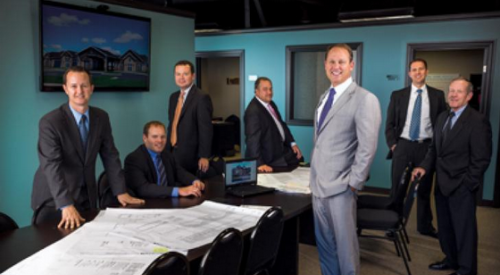Imagine a company that rewards employee performance with vacations in Maui or the Cayman Islands. Imagine a company where the CEO and chief operating officer don’t just breeze through the office when they visit, but stop and ask, "What can we do for you?" Imagine a company that solicits employee input at every level and often makes the very changes suggested.
The team members at David Weekley Homes don’t have to imagine -- they live that reality every day. This year David Weekley Homes ranked No. 33 on Fortune magazine’s list of "The 100 Best Companies to Work For" -- the first home builder to make the list. Weekley employees are eager to share why it’s such a great place to work. They use words such as "extraordinary" to describe it. They passionately state: "I love my job!" and "I was lucky to be hired." If another company came along and offered them more money, they wouldn’t take it, not if it meant having to give up the caring attitude that abounds here.
| Barbara Zemak, an office coordinator in Charlotte, N.C., for David Weekley Homes, has worked for the company three years. Her division won a trip to Maui for their strong employee performances.
|
"It’s a lot more than Maui," says Barbara Zemak, office coordinator in Charlotte, N.C. Zemak, 50, has worked for the company for three years; her division won the Maui trip last year. "The people here are like family -- they take a personal interest in you, they care if you’re going through a personal crisis," she says. "I’ve been around a long time. There is no comparison -- I have never worked for a company where the president comes to an office and talks with employees every time. Both David Weekley and John Johnson personally shake our hand and ask if there’s anything they can do to help us."
The team-based approach at David Weekley Homes is a major factor that sets it apart from other companies where Zemak has worked. "If I’m stuck on something or need help, one or all of my team members are willing to help, and if they can’t, together we go through the office until we find someone who can."
When Chelonda Hunt, 35, a Houston project coordinator, signed on with the company 10 years ago, the team concept wasn’t in place. She particularly welcomed the company’s transition.
"We used to do gross reviews twice a year, where employees met with managers to discuss job performance and improvements," Hunt says. "But the problem was, six months went by before finding out something should be done differently. Now we do them four times a year, and it makes you feel better about coming to work."
For Houston builder Obi Illona, 36, the company offers a rare blend of direction and empowerment. Now in his sixth year with Weekley, Illona has worked for other home builders who micro-managed and sent employees packing if they disagreed about how a job should be done.
"The difference is night and day," Illona says. "At Weekley Homes properly defined goals are set and well-known to everybody, as are management’s expectations of employees. At the same time, they welcome new ideas about solving problems. I’m not just a robot; I’m empowered to make decisions, to be creative. I feel lucky to have been hired and be treated with absolute respect."
Effecting Change
Mistakes, a dreaded issue for many employees in most organizations, aren’t viewed that way at David Weekley Homes, says Charmaine Parker, 31, a division coordinator in Nashville, Tenn., who has been with the company 3 1/2 years. "It’s a fail-forward kind of concept. Learn from your mistakes -- that’s the key. Beatings don’t commence at 2 o’clock. There is the opportunity to go back and fix it."
If any employee thinks the company has made a mistake or can improve upon a process, David Weekley himself wants to hear about it. Twice a year, Weekley surveys his teams about company programs such as benefits, compensation, work processes and career paths.
"Our team-member surveys are anonymous," Weekley says. "We get honest feedback without fear of retribution."
Orlando, Fla.-based senior sales consultant Amber Massey, 23, says she was skeptical about the survey she received in the fall of 1999. "I thought it would get lost. I was wrong," Massey says. "Within a month, we had a letter from Mr. Weekley himself about all the things they were going to change as a result of the survey."
For example, a big issue for Massey and her sales team members was working on Easter, July Fourth and New Year’s Day. "They gave us those days off, and it really makes a huge difference for us."
Other corporate personnel changes that resulted from employee feedback include an increase in the company’s profit sharing and a decrease in insurance copayments. However, employee suggestions and corporate improvements go well beyond the HR realm. Hunt says that Weekley uses survey data to act on team members’ ideas for improving job efficiency.
"For example, now we can access the sales system from home if we need to. There is a Web site for employees, and both came from a team member’s suggestion," she says.
Surveys even allow team members to evaluate the performance of managers. "If there’s an area you’re high or low in, it makes you reflect on your style and work with the team to find out what adjustments you can make to help them," says Ken Swisher, a project manager in Austin, Texas.
Training and education also rank high on the team members’ lists. When Massey became a sales consultant in 1997, a lead sales consultant served as her mentor. She attended scheduled training classes that focused on a home buyer portfolio called TRUST: "Trust build, Recognize needs, Understand motivation, Select and demonstrate the home, Trust close."
Massey especially appreciates the mandatory classes that are necessary to move forward in the company, as well as voluntary classes that team members can take to improve skills.
"I never feel limited. I feel like I can constantly get better no matter how much I think I know," Massey says. "One key point about this company is that we’re forever improving."
Zemak adds: "If there is any type of class, be it a college, real estate or computer course we want to take, we just discuss it with our manager, and 99% of the time it’s approved."
Growth Potential
Parker says that upper management plays a key role in helping team members realize their potential. She hired in as a builder service representative and now supports division president Richard Chapman. The promotion meant an increase in her responsibilities beyond her home office; at least once every quarter she participates in training sessions for new team members in Atlanta, Charlotte, Raleigh, N.C., and Charleston, S.C.
| Obi Illona is encouraged to be creative.
|
"Richard believes in developing people and having them grow into leadership roles," Parker says. "When I hired in with the company, if anyone had told me I would have been doing this down the road, I would have said no way!"
Even though most say their jobs are challenging, they also say that David Weekley Homes is a "fun" place to work.
"The work environment is fun, but so are the after-work activities, whether it’s a softball team or meetings where we go bowling," Massey says. "The company does a very good job at placing people so the chemistry is strong."
And those trip contests always keep the job exciting. Zemak was among the 500-plus team members who won last year’s trip to Maui. Each got to take a spouse or significant other.
"It was the best trip, the best vacation I’ve been on in a long, long time," Zemak remembers. "Every night there was a dinner, we played games, had a beach party, and we stayed in a beautiful hotel!" Another highlight was meeting fellow team members from Houston and Denver whom she’d talked to on the phone for two years.
To win this year’s trip to the Caymans, teams have "to beat their revenue budgets, beat profit percentages, lower hard costs and improve customer satisfaction rates," Weekley says. "If all 1,000 employees do it, they all go."
Massey’s division will miss out on the Caymans this year, but at the time of this interview she was excited about another incentive program. The contest ran from Jan. 1 to Feb. 29; if she sold three homes in January, she’d receive a $500 bonus; if she sold three more in February, she’d get the bonus and the trip.
| Charmaine Parker has seen her responsibilities and rewards increase steadily.
|
David Weekley is implementing yet another plan to improve the quality of life on the job. During the second quarter this year, the company will place on-site chaplains in each of its 14 cities, a team of one woman and one man who will serve as a support resource for team members. Hired through Marketplace Ministries, the chaplains are usually ordained ministers with counseling experience and specific training to work in a business environment, Weekley says.
"The issue behind this is that in our mobile society oftentimes people don’t get grounded in the community or have the relationships to help them through tough times -- whether it’s getting married, having kids, divorce -- any life events," Weekley says. "It used to be that we lived near our nuclear families; that’s changed. The company can help to some degree, but it’s always still the company, and sometimes people are reluctant to share what’s bothering them.
"This is not an attempt to push religion but to have people available to spend time with folks and get to the right resources without having to go to the boss on personal issues."
Weekley adds that the chaplains won’t be direct employees of the company and that employee-chaplain discussions will be "100% confidential. It’s a kind of employee assistance program that deals more with the emotional and spiritual side of life; things companies don’t usually get involved in, but these are needs we each have. I’m looking for ways to enhance people’s lives, trying to find ways we can help without being intrusive. If the military can have chaplains, why can’t a business?"
The Up Downside
| Amber Massey has seen changes made as a result of her survey responses.
|
But what about the downside to working at David Weekley Homes? Even though it exists, it doesn’t get anyone down. As Massey, who works 50 to 55 hours a week, puts it, "I would say my downside is that I work too much, but I want to work. It can be a little straining because my husband and I both work for the company. Our life is our job. To be successful, it’s not a 9-to-5 job. I put in extra so I can get out extra."
"By no means are we a perfect company," Parker explains. "Some of our processes are not always the easiest to understand. Our purchase order and accounting system is very detailed and in-depth, and it takes team members who do understand to explain it to new team members."
Hunt says she’d like to make a little more money, but good benefits and the fact that the company is working on salary increases help compensate for that. Even if another home builder offered her a hefty salary, she says she wouldn’t cash in the attitude of David Weekley Homes. "I feel appreciated, really appreciated by the company."
The only downside for Illona is the pressure he sometimes puts on himself "when I try to accept more responsibility than I’m capable of. But I don’t get chewed out when that happens -- they find a way for me to get it back on track."
When it comes to summarizing David Weekley Homes’ greatest strength, perhaps Parker says it best:
"It’s the overall environment of the company that really draws you in -- it’s extraordinary, it’s not typical. The network of teamwork that is established in this company is pretty remarkable."
See Also:
The Modern Manager
How David Weekley Homes Made the List











